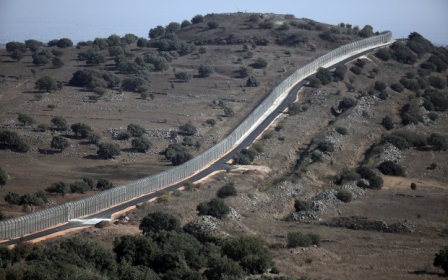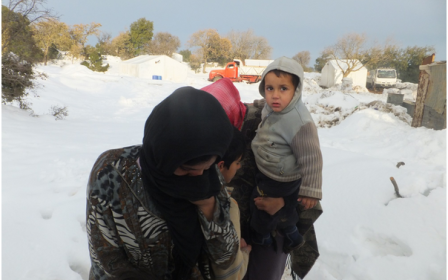The ‘Facebook spy’ who exposed Israel’s support for Syria rebels

In 2012, Israel released the longest-serving Arab security prisoner, Sedki al-Maket, from prison. He had served 27 years on charges of planning a terror attack. Al-Maket, age 48, is a resident of Majdal Shams, the major town in Israeli-occupied Golan.
On gaining his freedom, he turned to fighting Israel’s 45-year occupation of the Golan. Al-Maket is an ardent supporter of the Assad regime and views Syria as his homeland. As such, he embraces Assad’s ally, Hezbollah, and those supporting liberation of Israeli-occupied territory in Lebanon, the Golan or Palestine.
Since his release, he has not engaged in violence or armed struggle. He has made speeches, written articles in the Arab press, posted to social media, and blessed armed struggle without participating in it. In addition, the security services claim al-Maket scouted IDF activities in the Golan, especially army aid offered to the Syrian Islamist rebels associated with al-Nusra.
It’s been widely reported in VICE News, the Wall Street Journal, Fox News and elsewhere, that Israeli commando forces enter Syria to liaise with Syrian rebels, and that the IDF provides medical treatment in Israeli hospitals for wounded Islamist rebels, and that the army supplies the rebels with crateloads of military equipment and supplies. PressTV has published photographs of daytime meetings between the IDF and Syrian militants. The Israeli media videotaped a camp for Syrian rebels inside Israel-held territory.
Video showing IDF-Nusra meeting
In February, after possibly being tipped off by an IDF soldier, al-Maket produced a video in which he described - without showing it - a nighttime meeting between the IDF and al-Nusra commanders. The Golani activist then arranged for the video to be aired on Syrian state TV.
That was the last straw for the Israeli security apparatus. They could tolerate pro-Syria social media agitprop, but using the Syrian media to embarrass the IDF went one step too far. I reported in my blog in late February, based on a confidential Israeli source, that al-Maket had been secretly arrested by the Shabak. His arrest was placed under gag. Outside of Syrian media, I was the only journalist who revealed his arrest. No Israeli media could report anything regarding the case.
Subsequently, a number of other alleged “co-conspirators” in what the Israeli media has come to call a Syrian “spy ring” were arrested. One of them was a Druze IDF soldier, Corporal Hilal Halaby, from Daliat al-Carmel (near Haifa). In his case, I was the first journalist to report his arrest thanks to information conveyed to me by a confidential Israeli source, which was under gag as well. Only in the past few days have the security services lifted this gag and reported that Halaby is being charged with aiding and abetting the “notorious” pro-Assad spies.
Haaretz reported on the charges against Al-Maket. There are scores of them, most of which involve aiding a terrorist organisation, contact with an enemy agent, and aiding an enemy in time of war. Considering that there’s been an armistice in force since 1973, it’s hard to understand how Israel is at war with Syria.
Embarrassing charges against Israel
The indictment also indicates that many offenses remain secret and are not even known to al-Maket’s former attorney, Labib Habib. But Habi did say that he believed these were activities which exposed IDF collusion with al Nusra. As Israel doesn’t wish the world to know it’s collaborating with an Islamist militia allied with al Qaeda, these charges are the most embarrassing and potentially explosive.
Habib also told me that he was denied contact with his client for 10 days. During that period his interrogators tortured him. Among the methods they used according to the defence attorney, were slaps to the face and severe shaking. All of these methods have been prohibited by the Israeli Supreme Court except in circumstances of extreme exigency in order to prevent an imminent terror attack. Such was not the case in al-Maket’s detention. But that makes little difference since the Supreme Court, unlike in other democratic countries, cannot force the security forces to obey its directives. It can only rule and hope it will be obeyed. It often isn’t when it comes to national security suspects.
As I wrote above, al-Maket chose attorneys to represent him in his legal proceedings. But the security forces chose to invoke a rarely used rule (Hebrew) that demands a security prisoner be represented only by defence attorneys with a high-level security clearance. This demand is a feature of the military justice system. But al-Maket is a civilian, albeit not a citizen. Instead of being judged under civilian law, he will be judged under a hybrid system of civilian-military law. The defence minister invokes principles from military law when he needs them.
Denied choice of counsel
There are two problems with this approach. The first, obviously, is that a basic right of a defendant is to have counsel of his choosing. Second, in order to get a security clearance, a lawyer generally has to have served either as a military prosecutor, or in some legal capacity with the police or security services. That means these lawyers are already inclined to offer broad leeway to their former bosses and to absorb the lessons of their previous employment. They are known, in many cases, as being pliant in the face of the state’s demands. Since very few Israeli Palestinians serve in the IDF, there are few such attorneys with security clearances. This means al-Maket will have to choose a Jewish attorney who likely possesses a military or intelligence background. Not an auspicious start to a legal defence.
Attorney Habib filed an appeal of the judge’s decision to compel al-Maket to hire a lawyer with a security clearance. The appeal was scheduled to be heard by Supreme Court Justice Salim Jourbran, the only Israeli Palestinian justice serving on the High Court. After an appeal by the state, Justice Jourbran was removed and replace by a Jewish justice. If you’re detecting a pattern, it’s no accident. The deck is always stacked against security prisoners in such cases. The defence often doesn’t see the evidence against the accused and doesn’t get to cross-examine witnesses. Judges are extraordinarily obeisant before the altar of national security. Generally, since convictions are guaranteed, defendants agree to plea deals, which sometimes reduce the sentence by half of that which an outright conviction would bring.
The state prosecutor has circulated the partial indictment against the detainee which includes scores of charges, though scores more remain under seal and may not be reported in Israel. I’ve obtained a copy of the partial charge sheet. He’s accused, beginning in 2014, of acts of espionage, supporting a terror organisation, making contact with a foreign agent, and aiding an enemy in time of war.
A 'spy' using social media?
There are a number of extraordinary things about the indictment. Perhaps foremost is his espionage consists mostly of posting comments and videos to Facebook and YouTube. Al-Maket may be the first individual accused of spying through social media. Along with a description of the content of the posts, the clerks in the Shabak or prosecutor’s office have taken the trouble to compile the number of Likes, Shares and YouTube Clicks his posts obtained. Does Shabak measure a spy’s success by the number of Likes he has?
In addition, I’m confused about why a spy, whose activities presumably are meant to be secret, would make use of a very public form of communication: social media. Or is Israeli intelligence accusing Syria and al-Maket of pioneering new forms of espionage previously unknown?
The prosecution accuses the pro-Syria Druze of posting material he knew would aid Syria. But if this is true and it did aid the enemy, why did the Shabak allow him to continue with such activities for over a year? Why is his Facebook account still publicly accessible? Presumably, if al-Maket’s activity endangered Israeli security it could make a reasonable case to Facebook to close it. Apparently, it either hasn’t approached Facebook, or if it has, it couldn’t persuade the company of the danger. If it couldn’t persuade Mark Zuckerberg, why should it persuade the Israeli public?
If al-Maket is truly a Facebook spy, he had about as much success as Russian spy Anna Chapman. Rather, he was much less a spy and much more a deliberate irritant of the Israeli security services. Israel is one of the few nations calling itself a democracy that imprisons enemies of the state merely for irritating the country’s intelligence apparatus.
The IDF itself has not been shy about exploiting social media to convey its message to the world. It even used Twitter instead of the convention press statement to announce the start of Operation Pillar of Defence and to boast about the assassination of Hamas military commander Ahmed al-Jabari. If Israelis can boast about murdering Palestinian leaders why can’t a man oppose Israeli occupation of his homeland on Facebook?
Fox News exposes Israel's Syria actions
Foreign journalists too, reporting from the Golan, have published stories similar to al-Maket’s. Fox News even filmed an Israeli commando unit returning from a field operation inside Syria. According to a confidential Israeli source, they were rallying Syrian Druze to fight against the Assad regime. Since Fox News, like Israeli media, is subject to IDF censorship, we can assume this report was approved by the military. If a foreign journalist can report this, then why can’t a Golani Druze?
Many of the charges note that the Druze activist often toured the Golan area near the armistice-line between Israel and Syria and then posted to Facebook the results of his trips. He recounts seeing IDF military personnel leaving crates on the border for delivery to al-Nusra militants. He notes, in one case, that an IDF column made its way toward a village in the Syrian Golan, thus violating Syrian sovereignty. One charge notes that al-Maket found several gates in the fence which were unlocked, presumably to allow access either for the IDF into Syria or the Syrian rebels into the Israeli-held Golan. In effect, al-Maket is revealing lapses in Israeli security on the border to Israel’s security services, who were monitoring his Facebook postings.
The prosecution manages to twist this activity into scouting weaknesses in Israeli security which would allow a Syrian terrorist to infiltrate Israel and attack. To my knowledge, no Syrian has ever infiltrated Israel to commit an act of terror since before the 1967 war. Why a Syrian dictator fighting for his life against domestic rebels would want to take the trouble to open a new front against Israel is hard to explain.
Posting pictures now a crime
Another charge claims that the Golani Druze posted pictures of burning IDF vehicles hit by Hezbollah rocket fire. Two soldiers were killed in the attack, which was in retaliation for Israel’s air attack on an Iranian convoy days earlier which killed an Iranian general and Hezbollah commanders. The prosecutor says that al-Maket’s display of the burning vehicles and his support for the retaliation against the IDF are tantamount to incitement to terror. Supposedly, social media postings encourage new acts of violence. This may be one of the first times someone has been accused of fomenting terrorism for posting a picture online.
Nowhere in the indictment does the state argue that al-Maket engaged in violence or took up armed struggle. He merely voiced support for resistance to Israeli occupation of the Golan and Palestine. While it is true that he praised armed struggle, including the forces of Bashar al-Assad and Hezbollah, he never engaged in any act remotely connected to it. He didn’t plan a terror attack, he didn’t meet with anyone planning such an attack.
The defendant faces decades in prison on these charges. There is little chance he will be found innocent. The only unknown is - will he cut a deal with the state offering a “reduced sentence” of a decade in jail or go to trial and face a sentence of multiple decades. Most take the deal.
Setting a precedent
Israeli Jews would, if they were smart, worry about the precedent this arrest sets. If al-Maket can be jailed for social media activism, anyone can be charged for reporting on Facebook virtually anything about the IDF or security services which they prefer remain secret. Of course, there’s a distinction between Jews and non-Jews and Jewish citizens would likely be treated with more discretion.
Al-Maket and his fellow Golani Druze find themselves in an awkward position. Like East Jerusalem, they have been annexed by Israel in violation of international law. And also like Palestinians from East Jerusalem, they’ve refused to take Israeli citizenship in protest at Israel’s occupation. Because they are not citizens, they have less rights under Israeli law. Yet the idea of resistance to Israeli conquest and occupation is no less important to them. If they do protest, even non-violently as in the case of al-Maket, they face torture, conviction and decades separated from loved ones in an Israeli prison.
- Richard Silverstein writes the Tikun Olam blog, devoted to exposing the excesses of the Israeli national security state. His work has appeared in Haaretz, the Forward, the Seattle Times and the Los Angeles Times. He contributed to the essay collection devoted to the 2006 Lebanon war, A Time to Speak Out (Verso) and has another essay in the upcoming collection, Israel and Palestine: Alternate Perspectives on Statehood (Rowman & Littlefield).
The views expressed in this article belong to the author and do not necessarily reflect the editorial policy of Middle East Eye.
Photo: An Israeli soldier speaks on his mobile phone at a military outpost during a visit of Israel's Prime Minister on February 4, 2015 at Mount Hermon which sits in the Israeli occupied Golan Heights on the border between Lebanon, Syria and Israel. (AFP)
Middle East Eye propose une couverture et une analyse indépendantes et incomparables du Moyen-Orient, de l’Afrique du Nord et d’autres régions du monde. Pour en savoir plus sur la reprise de ce contenu et les frais qui s’appliquent, veuillez remplir ce formulaire [en anglais]. Pour en savoir plus sur MEE, cliquez ici [en anglais].





